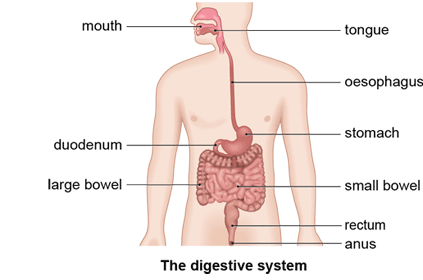Indigestion (dyspepsia) affects around four in every 10 people in the UK every year. It’s a term that refers to several symptoms, including pain or discomfort in your upper abdomen (tummy). You’re most likely to notice the symptoms after you’ve eaten, but you can get them at any time. You may get indigestion every day or once in a while.

You can have the following symptoms after eating or drinking:
- heartburn – a painful burning feeling in the chest, often after eating
- feeling full and bloated
- feeling sick
- belching and farting
- bringing up food or bitter tasting fluids
Most people with indigestion don’t seek medical advice if their symptoms are mild. You may be able to manage your indigestion yourself by taking over-the-counter medicines from a pharmacy. But if your symptoms are severe, come on after you exercise, or are worse or different to your usual indigestion, contact your consultant.
Indigestion can sometimes be a symptom of a more serious condition. See your consultant if you:
- are losing weight but don’t know why
- have persistent symptoms of indigestion for the first time and you’re 55 or older
- are finding it difficult to swallow
- are vomiting regularly
- notice blood in your vomit or faeces
- have black, tar-like stools or what looks like coffee grounds in your vomit
- have had your symptoms for more than a few weeks
Occasionally a heart attack can cause indigestion-like symptoms. Call for emergency help if you have the following symptoms alongside indigestion:
- tightness or heaviness in your chest
- palpitations (when you can feel your heart beating fast or irregularly)
- sweating
- difficulty breathing
Diagnosis of indigestion
Your consultant will ask about your symptoms and what makes them better or worse (such as alcohol, exercise or certain foods). It might help to keep a diary. They’ll also examine you and ask you about your medical history.
Your consultant may recommend further tests.
- Breath tests, blood tests or faecal (stool) tests. These will check you’re not losing blood, which can lead to anaemia. They can also check for Helicobacter pylori (H. pylori), which is a bacterial infection.
- An upper gastrointestinal endoscopy (gastroscopy). This looks inside your oesophagus (the pipe that links your throat to your stomach), stomach and the first part of your small bowel (duodenum). During a gastroscopy, your doctor may take a biopsy (a small sample of tissue). This will be sent to a laboratory for testing.
- A barium meal X-ray. If you have a barium meal, you’ll be asked to drink fluid containing barium (a substance that shows up on X-rays). X-ray images will show the inside of your stomach and small bowel more clearly.
Treatment of indigestion
Over-the-counter medicines
You can buy several indigestion medicines from your pharmacist without a prescription. Always read the patient information leaflet that comes with your medicine and ask your pharmacist for advice if you’re unsure about anything.
You can take antacids for occasional symptoms. These relieve indigestion by neutralising acid in your stomach. Antacids usually contain magnesium or aluminium. You can take antacids when your symptoms occur or if you’re expecting them to flare up (such as before you go to bed). Liquid products tend to work better than tablets.
Some indigestion medicines contain antacids with alginates or simeticone. Alginates form a raft over your stomach contents and may help if acid rises from your stomach into your oesophagus, causing heartburn. Simeticone is an antifoaming agent, which breaks down bubbles of gas in your digestive system to relieve wind and bloating.
If antacids don’t work, or you need to take them regularly to relieve your symptoms, your pharmacist may recommend some other medicines. Proton pump inhibitors, such as omeprazole, work by stopping your stomach producing acid. You can take an over-the-counter proton pump inhibitor for up to four weeks.
If you can’t take a proton pump inhibitor, you may be able to try H2 receptor-antagonists (H2RAs), such as cimetidine and ranitidine instead. These also work by reducing how much stomach acid you produce.
Prescription-only medicines
If a Helicobacter Pylori (H. pylori) infection is causing your indigestion (see our causes section below), your consultant may recommend a combination of antibiotics to kill off the bacterial infection and medicines such as proton pump inhibitors to reduce the amount of acid your stomach produces.
If a proton pump inhibitor controls your symptoms well, your consultant, after assessing your condition, may prescribe one that you can take for a longer period of time. They’ll usually suggest you take a lower dose once your symptoms are under control. If you can’t take a proton pump inhibitor, you may be prescribed an H2 receptor-antagonist instead. Ask your GP or pharmacist for more information.
Always ask your consultant or pharmacist for advice and read the patient information leaflet that comes with your medicine.
Causes of indigestion
Your consultant may not find a specific cause for your indigestion. But certain things may trigger off your symptoms, such as:
- being overweight
- drinking too much alcohol
- eating certain foods, such as fatty foods
- smoking
- stress and anxiety
- medicines, such as aspirin and non-steroidal anti-inflammatory medicines (NSAIDs)
Underlying health conditions
Indigestion can be caused by a number of health conditions.
You may have a peptic ulcer, which is a break in the lining of your stomach or small bowel. You can get a peptic ulcer if stomach acid, which helps digest your food, damages your stomach lining. A peptic ulcer can also be caused by Helicobacter pylori (H. pylori) bacteria that sometimes live in your stomach. The bacteria can damage your stomach lining by increasing the amount of acid produced in your stomach.
Your indigestion may be caused by a condition called gastro-oesophageal reflux disease (GORD). This is when acid leaks out of your stomach and into your oesophagus.
Stomach (gastric) cancer can also cause indigestion.
Sometimes indigestion-like symptoms aren’t related to your digestive system. They may be caused by something else, such as a heart attack.
Pregnancy
You may get indigestion during pregnancy due to changing hormone levels and the increased pressure in your abdomen (tummy). The symptoms can start at any stage of your pregnancy.
